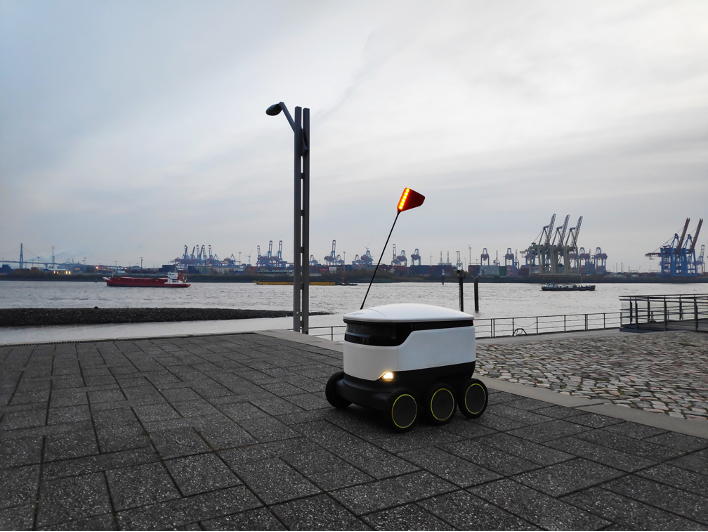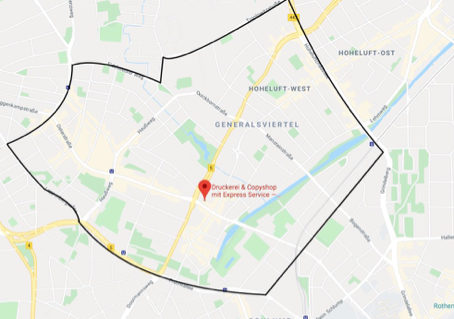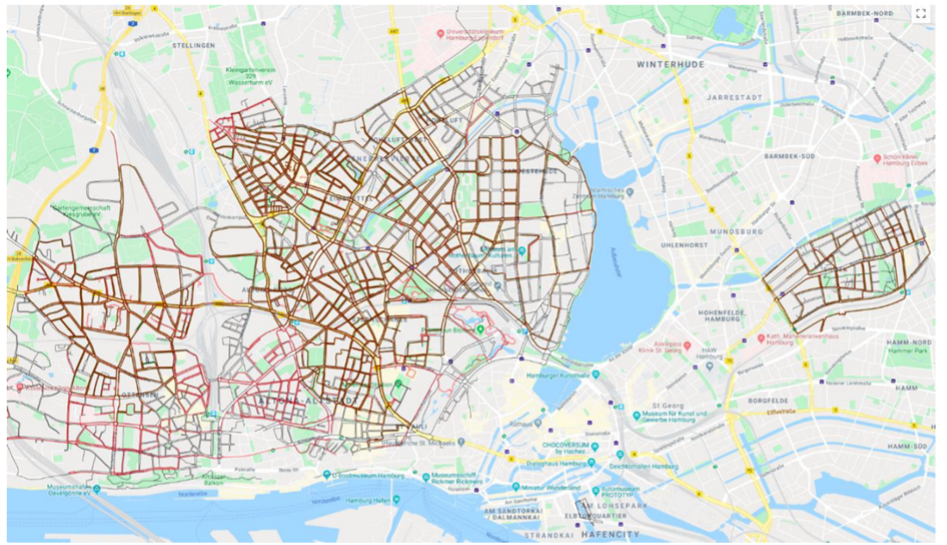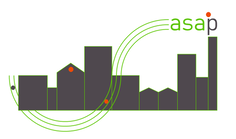Hamburg | Starship
Description
Starship - autonomous delivery robots
Starship initiated operations in Germany in 2017 and selected the City of Hamburg as its first location. From 2017 to 2018, Starship was permitted to operate on the public streets in the City of Hamburg, pursuant to a Special Permit that was granted by the City. The Special Permit contained a condition, which required that the robots be accompanied by a robot handler during deliveries, even though the devices were being operated autonomously. In 2019, the City of Hamburg granted Starship a “handler-free” Permit. At present, Starship has a number of commercial partners in Germany, operating on private industrial sites. (See below).
Operations in Hamburg with Handler: 2017-2018
As mentioned above, from 2017-2018, Starship operated in the City of Hamburg, pursuant to a Special Permit, requiring a robot handler. As such, Starship’s robots were supervised by a handler who would follow behind the robot during deliveries on public streets and sidewalks. Naturally, this approach was unsustainable as a business model, due to the cost of service.
During this time, Starship’s robots travelled a total of 20,876 km (autonomously) in the City of Hamburg and completed 7,164 deliveries. Starship’s commercial partners were focused on food & parcel deliveries and included: working together with Hermes, a German logistics company; foodora, a food delivery company; and Domino’s. In addition, Starship worked with two local retail stores in Eimsbüttel, located in the east of Hamburg.
Overall the robots were positively received and resulted in positive media coverage.
It is worth mentioning that operations were safe at all time; no special incidents were registered and no accidents causing property damages or personal injuries took place. During the time of operation, Starship robots mapped large parts of the City of Hamburg. (See Map 2).
Operations in Hamburg Without Handler: Spring 2019 to Present
In the Spring of 2019, the City of Hamburg granted Starship a Permit for handler-free operations on public sidewalks.
In December 2019, Starship launched its commercial handler-free operations in Hamburg. In a selected area within the district of Eimsbüttel (see Map 1) commercial operations were started in a limited volume and with a local commercial partner. This local partner offered delivery by Starship robots at two afternoons per week in the designated area.
There have also been:
In addition to its operations in Hamburg, Starship is working on a number of industrial sites throughout Germany.
Starship is currently operating handler-free on private industrial campuses, including on Daimler’s campus in Hamburg-Heimfeld.
(Source: Starship Technologies report from 2019 and 2020)
Starship initiated operations in Germany in 2017 and selected the City of Hamburg as its first location. From 2017 to 2018, Starship was permitted to operate on the public streets in the City of Hamburg, pursuant to a Special Permit that was granted by the City. The Special Permit contained a condition, which required that the robots be accompanied by a robot handler during deliveries, even though the devices were being operated autonomously. In 2019, the City of Hamburg granted Starship a “handler-free” Permit. At present, Starship has a number of commercial partners in Germany, operating on private industrial sites. (See below).
Operations in Hamburg with Handler: 2017-2018
As mentioned above, from 2017-2018, Starship operated in the City of Hamburg, pursuant to a Special Permit, requiring a robot handler. As such, Starship’s robots were supervised by a handler who would follow behind the robot during deliveries on public streets and sidewalks. Naturally, this approach was unsustainable as a business model, due to the cost of service.
During this time, Starship’s robots travelled a total of 20,876 km (autonomously) in the City of Hamburg and completed 7,164 deliveries. Starship’s commercial partners were focused on food & parcel deliveries and included: working together with Hermes, a German logistics company; foodora, a food delivery company; and Domino’s. In addition, Starship worked with two local retail stores in Eimsbüttel, located in the east of Hamburg.
Overall the robots were positively received and resulted in positive media coverage.
It is worth mentioning that operations were safe at all time; no special incidents were registered and no accidents causing property damages or personal injuries took place. During the time of operation, Starship robots mapped large parts of the City of Hamburg. (See Map 2).
Operations in Hamburg Without Handler: Spring 2019 to Present
In the Spring of 2019, the City of Hamburg granted Starship a Permit for handler-free operations on public sidewalks.
In December 2019, Starship launched its commercial handler-free operations in Hamburg. In a selected area within the district of Eimsbüttel (see Map 1) commercial operations were started in a limited volume and with a local commercial partner. This local partner offered delivery by Starship robots at two afternoons per week in the designated area.
There have also been:
- Operations of contactless delivery in cooperation with local commercial partners during lockdowns
- contactless deliveries of PCR-Tests (B2C)
- Delivery of samples between laboratories and hospitals (B2B)
In addition to its operations in Hamburg, Starship is working on a number of industrial sites throughout Germany.
Starship is currently operating handler-free on private industrial campuses, including on Daimler’s campus in Hamburg-Heimfeld.
(Source: Starship Technologies report from 2019 and 2020)
Innovation and Relevance
The autonomous delivery robots of Starship are part of the testbed category I of neglected routes. Typically, transporters are used in last mile CEP logistics. Since the delivery robots of Starship are of a smaller dimension than these transporters, they are using sidewalks instead of roads, and therefore are freeing up space to potentially avoid congestion. The spatial shift away from the road helps addressing current problems like double parking and the related traffic safety issues. It also means reducing harmful emissions of CO2 and NOx, as the robots are powered by zero carbon electricity.
Relation to other urban Logistics Projects
n.a.
Plans for Future Development
- Currently focus on private companies and private grounds
- Operations in the district of Eimsbüttel are ongoing and currently in the process of renewing the “handler free” permit
Impressions
Fotocredits: © Starship Technologies / Report 2019, 2020





